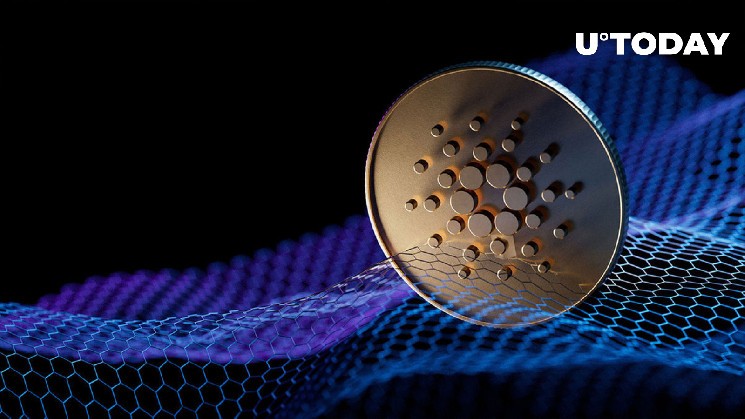Cardano (ADA) Expects to Make Three Major Releases in 2023

Expectations for Cardano (ADA) are high for 2023. In this new year, the Ethereum (ETH) competitor may realize in the next 12 months some promises made between 2021 and 2022 that were not delivered on by the smart contract blockchain.
One such promise is the arrival of nonsynthetic stablecoins. While not new, it is one of the highest expectations of ADA investors, as a stable asset may help Cardano grow significantly in decentralized finance (DeFi).
Despite being one of the major problems seen in 2022 for several Layer 1 projects, as maintaining the peg of a stablecoin is not an easy task, Ethereum killer investors are more optimistic than pessimistic about this launch that should take place at the beginning of this year.
Two stablecoins are expected on the Cardano network for the first quarter of 2023: First is centralized stablecoin USDA, which will be a U.S. dollar-backed asset. To maintain its parity, it will use fiat assets and still enjoy Cardano benefits such as network efficiency.
Another well-awaited stable asset is Djed, a token developed in partnership with Coti. The stablecoin will maintain its peg to the dollar through Cardano’s smart contract design. In order to maintain this peg, Djed will have a reserve of base currencies that it will mine, and it will burn other stable assets and reserve currencies to contain fluctuations.
Hydra, Layer 2 scalability solution
In 2022, Cardano took a big step toward its network scalability through the Vasil hard fork. However, previous blockchains such as Bitcoin (BTC) and Ethereum have shown that a scalable network is a constant concern for cryptocurrencies looking to be used in everyday life.
Cardano has shown interest in further developments in this area. One proof of this is the preparation for Hydra, a Layer 2 scalability solution. Hydra aims to improve transaction speed through low latency and high throughput without giving up low transfer rates.
The first member of the family is Hydra Head. It will enable developers to add complex and specialized protocols on top of Cardano. According to Charles Hoskinson, this Hydra layer can facilitate other things, such as fast finishing, microtransactions, and micro-gorging.
This must be one of the most important developments for the cryptocurrency team. After all, the whitepaper was released in March 2020.
Oracles on Cardano
Rounding out the list of expectations is Oracles on the Cardano blockchain. This modality is particularly important because it manages to connect on-chain and off-chain data. A fitting example of oracle growth is through Chainlink (LINK), which manages to deliver this modality to smart contracts on Ethereum, helping them to reach their true potential, which may also help in the market acceptance of the ADA network.
Examples of implementations for oracles are atomic swaps, cross-chain liquidity pools and pricing decided by mutually agreed oracle data. With the help of this key area for the blockchain industry, Cardano further qualifies as a major Ethereum competitor.
In 2022, the altcoin market got to know Charli3, Cardano’s decentralized oracle. In contrast to older oracle solutions, ADA’s on-net design avoids flexibility and scaling issues, and that is precisely what is expected for Cardano’s next oracles in 2023.






 Bitcoin
Bitcoin  Ethereum
Ethereum  Tether
Tether  USDC
USDC  TRON
TRON  Dogecoin
Dogecoin  Cardano
Cardano  Bitcoin Cash
Bitcoin Cash  Monero
Monero  Chainlink
Chainlink  LEO Token
LEO Token  Stellar
Stellar  Zcash
Zcash  Litecoin
Litecoin  Hedera
Hedera  Dai
Dai  Cronos
Cronos  Tether Gold
Tether Gold  OKB
OKB  Ethereum Classic
Ethereum Classic  KuCoin
KuCoin  Cosmos Hub
Cosmos Hub  Gate
Gate  Algorand
Algorand  VeChain
VeChain  Stacks
Stacks  Tezos
Tezos  Dash
Dash  TrueUSD
TrueUSD  IOTA
IOTA  Basic Attention
Basic Attention  Theta Network
Theta Network  Decred
Decred  NEO
NEO  Synthetix
Synthetix  Qtum
Qtum  Ravencoin
Ravencoin  0x Protocol
0x Protocol  Zilliqa
Zilliqa  DigiByte
DigiByte  Nano
Nano  Siacoin
Siacoin  Holo
Holo  Numeraire
Numeraire  Waves
Waves  Ontology
Ontology  Status
Status  Enjin Coin
Enjin Coin  BUSD
BUSD  Hive
Hive  Pax Dollar
Pax Dollar  Lisk
Lisk  Steem
Steem  Huobi
Huobi  OMG Network
OMG Network  Bitcoin Gold
Bitcoin Gold  NEM
NEM  Augur
Augur  Bitcoin Diamond
Bitcoin Diamond